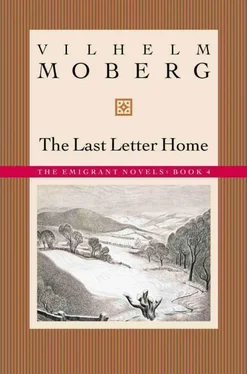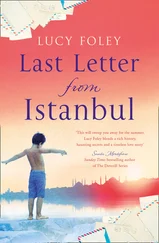Everyday life in Minnesota proved to be more prosaic, however. Moberg lamented the drabness of the state’s small towns, and the November chill brought uncomfortable reminders of Sweden. Still, it was the intolerance and bigotry he found in the Lutheran churches of the Upper Midwest that provoked him most. In the long run, the climate of Minnesota, both meteorological and spiritual, proved to be too rigorous. The North Star State bore the unmistakable stamp, he wrote, of Calvin, Zwingli, and northern European puritanism.
If Moberg had a love affair with America, it was with California. Beginning in the autumn of 1948 he lived in Carmel, where one of his American aunts rented a house to him. In the sunshine there and in close proximity to John Steinbeck’s Cannery Row, Moberg basked in what he called the joyous spirit of Petrarch and Bocaccio. Here he completed The Emigrants and began Unto a Good Land.
And it was here that he met Gustaf Lannestock, who became his translator. Lannestock was a native Swede who resided in Carmel, where he worked in real estate and collected rare books. They met by chance while walking on a California beach in the late 1940s. Moberg persuaded Lannestock to undertake the translation of the novels. Lannestock stayed with the translation project through the entire tetralogy. The friendship formed through this project lasted until Moberg’s death.
Moberg was not to stay put, however. A case of wanderlust (which was to last seventeen years) had taken control of him, as he explained years later. He moved to Florida in 1953, then back to the Monterey-Carmel area, eventually to Laguna Beach in California, and even spent some time in Mexico, with short stops in New York interspersed. In 1955 he returned to Europe, bothered by the political and literary winds blowing in America and admitting his failure at adjusting to American culture. He completed the emigrant tetralogy in Europe.
Themes in the Emigrant Novels
Moberg had a strongly populist view of history and rejected the mythologizing “great man” approach so popular among Swedish historians and novelists before his time. He argued that older writers had praised the deeds of Swedish monarchs and statesmen in an effort to keep the commoners as loyal, unquestioning subjects of the ruling classes. This approach he described as historical casuistry and blamed it for creating feelings of “ultra-royalism,” “ultra-patriotism,” and “ultra-heroism.” 14
In the process of emigration, Moberg saw a historical movement set in motion and sustained by daring commoners who acted without a significant portal figure as their leader. Emigration changed history, according to this argument, in that it deprived Sweden of a cheap labor supply and aided America in the building of a new society. On a material plane, America is the land where people of modest means but the right abilities can thrive. Karl Oskar is undistinguished as a leader of men. He is only “one emigrant among many emigrants,” according to one critic. 15Yet he is successful as a farmer in America because he possesses the proper practical skills. Karl Oskar is thwarted in Sweden but sees his hard work rewarded with ever-increasing affluence in Minnesota.
So interested was Moberg in this pioneering theme that he came to present his own actions in a similar, though more individualized, light. He wished to be viewed as the first in Sweden to practice the art of writing the documentary novel. Likewise, Moberg argued for his importance as the discoverer of the topic of Swedish emigration. Swedish scholars and writers before him had neglected the subject, he felt, because the movement revealed the Swedish government’s lack of foresight in failing to prevent it.
Just as Karl Oskar stakes his claim in Chisago County four years before the first historical permanent settlement of Swedes there, so Moberg, by his own reckoning, turned virgin literary soil in depicting the lives of ordinary Swedish Americans in Minnesota. In this respect, Moberg’s fertile creative imagination took control over his otherwise strong sense of realism. While no critics have questioned the historical accuracy of the Emigrant Novels, it is clear that other writers (both Swedish and American) had preceded Moberg in recording Swedish settlement patterns in the United States. In fact, Moberg listed names of some of those researchers in his own bibliography for the novels.
Still, Moberg’s faithful depiction of the lives of humble people involved in a historic undertaking remains constant throughout the Emigrant Novels. This narrative consistency is one of the strengths of the series.
Reading the Emigrant Novels as a psycho-history of Moberg and his America is perhaps equally as instructive as searching for historical motifs. Scholars have often asked how Moberg’s personal impressions of America after 1948 influenced the directions his epic narrative takes. It is tempting to view the storyline as leading in a linear fashion from poverty and oppression in the Old World to affluence and freedom in the New World. A more complex set of psychological variables can be seen to enter the novels, however.
In this connection, the Swedish novelist Sven Delblanc has pointed out how the dictates of realism led Moberg to conclude that the basic human condition is constant regardless of time and country. 16Likewise, Professor Rochelle Wright considered how Moberg — in spite of his early infatuation with America — often portrayed the new land as a “shadow kingdom,” a land to which one’s relatives disappeared, never to be heard from again. America was the great divider of families. 17
Karl Oskar and Kristina illustrate this theme. While Karl Oskar believes in their future in America with almost total optimism, Kristina sees their emigration as the abandonment of age-old traditions and the loss of an ancient Swedish birthright. Moberg never allowed the reader to forget Kristina’s homesickness for her native Småland.
Even Karl Oskar’s material success is tainted. First, he never fully understands the emotional impact of his leaving his own aged parents in Sweden. By the same token, he is slow to grasp the irony of his statement to Kristina that his children one day will thank him for taking them to America, when in fact they grow up to marry into other ethnic groups and leave Karl Oskar behind much as he had left his own parents. Furthermore it is ironic that the period of Karl Oskar’s rising prosperity on his Minnesota farm corresponds to the general time of Kristina’s death. It is after Kristina’s passing that Karl Oskar seals his fate by questioning God for the second time in his life.
In addition, it bears mentioning that a recurring motif in Moberg’s nonfiction writings was his admiration for the spirit of enterprise he saw in Americans. Yet he was equally as shocked by what he perceived as their callous individualism and lack of sympathy for the less fortunate in society. 18No character better embodies these traits than Karl Oskar, whose qualities of diligence and practicality are counterbalanced by his impatience with and lack of understanding for Robert, the incurable dreamer. Karl Oskar is also skeptical about Native Americans because he considers them lazy.
The Emigrant Novels should be seen, in short, in their full realistic light. They are stories of blighted hopes as much as of personal fulfillment. Of all Moberg’s characters, only Ulrika and Jonas Petter gain a kind of lasting happiness. Most of the others (from Inga-Lena to Kristina) succumb soon after their arrival here or long before their time. In the end, Karl Oskar remains, old and lonely, residing in Minnesota in body only.
Moberg saw at firsthand the difficulty of ever totally adapting to a new culture. He remained forever Swedish, perhaps despite himself. And in his novels he dramatized the problems of adaptation. Still, more than any other Swedish writer he succeeded in bridging the gap between the Old and New Worlds, between Sweden and Minnesota. The great resurgence of ethnic interest among Swedish Americans and their relatives in Sweden, which began in the 1950s and 1960s, was triggered largely by the Emigrant Novels.
Читать дальше












